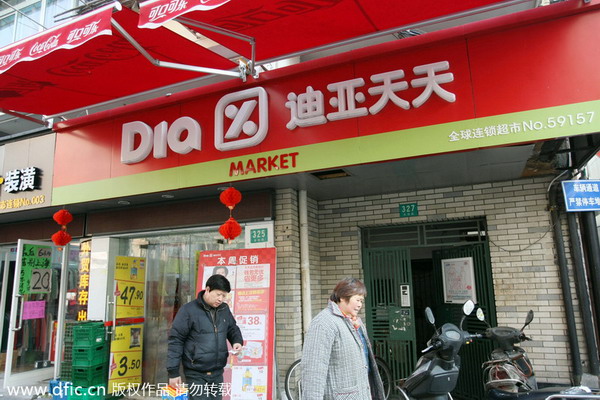|
 |
|
A convenience store is pictured in Shanghai, Jan 14, 2014. [Photo / dfic.cn] |
Beijing is the second-least-developed city for convenience stores in the country, although this part of the retail sector grew faster than department stores and hypermarkets last year, an industry survey shows.
According to the China Chain Store & Franchise Association, which released its China Urban Convenience Stores Index on Tuesday, the saturation level of convenience stores on the Chinese mainland is still relatively low compared with Japan and Taiwan, where there is one convenience store for every 2,000 residents. In China the average level is around 5,000 people. Dongguan scores the highest level with 2,667 people for every convenience store.
The index, offering an analysis of the development of convenience stores in 26 cities in China based on growth rate, saturation, percentage of operating hours and policy support, noted that convenience stores in Shenzhen, Dongguan in Guangdong province and Taiyuan in Shanxi province are the most advanced, while Shanghai and Guangzhou rank No 6 and No 9.
|
 |
|
 |
However, convenience stores are still considered to be the fastest-growing retail sector with a growth rate of 19.5 percent on average in 2013 among the surveyed 26 cities, higher than that of department stores and hypermarkets.
Wang Hongtao, director of the communication department of the association, said traditional retailers including department stores and hypermarkets have recorded slower growth because of the impact of the slowdown of the economy, the government's anti-corruption policies and emergence of e-commerce. But convenience stores, because of their proximity to communities and mass consumers, have been immune to those factors, said Wang, who is also general director of the convenience store committee.
Statistics show that the growth rate in Wenzhou in Zhejiang province, Hohhot in North China's Inner Mongolia autonomous region and Xuzhou in Jiangsu province has exceeded 50 percent. The number of new stores in Xuzhou doubled in the past year.
Shanghai is the only city that recorded fewer convenience stores last year.
Despite the rapid expansion of convenience stores, profits and the scale of business of convenience store brands are relatively low because of the fierce competition. The reports show that among 176 brands in the 26 cities, more than 10 brands compete in large cities.
Liu Yue, spokesman for Seven-Eleven (Beijing) Co Ltd, said high rents have become the biggest hurdle for convenience stores in major cities such as Beijing and Tianjin in the quest to open new stores. "It is common for landlords to raise rents, often to twice their previous levels," said Liu. "A new location with an affordable rent is hard to get nowadays in Beijing."
